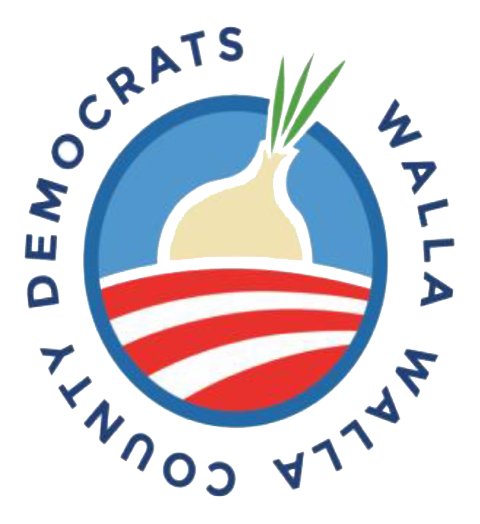How Democrats can reach out to Hispanic voters
On Tuesday, July 11, at 6:30 pm in the Walla Walla Public Schools office at 364 S. Park, the Walla Walla County Democrats heard from a panel of local Hispanic leaders on the topic of communicating with Hispanic voters.
David Fogarty introduced the panelists of the evening’s program
Michelle Morales, Benton County Deputy Prosecuting Attorney, former candidate for Walla Walla County Prosecuting Attorney.
Nadine Barragan Stecklein, Whitman College Assistant Director of Internship Programs, former candidate for the College Place City Council.
Roger Esparza, owner/broker of Bella Terra Real Estate, former candidate for the Walla Walla County Commission.
Dr. Carlos Acevedo, retired flight surgeon and psychiatrist with the Veterans Administration.
Mary Lopez, former organizer for One America, an organization that works to reform immigration laws and create pathways to citizenship for the undocumented.
The program opened with a presentation via Zoom by Andrew Hong, a research analyst of the Washington Community Council. He referenced his study on how Latinos voted in 2020 and 2022. The study is available here.
It showed a rightward shift to Donald Trump by Latino voters of up to 20%. This is a disturbing situation for Democrats, especially given that Latinos are a rapidly growing demographic in the nation. He concluded his report with this observation from his study:
“Democrats have lost working-class Latino voters by de-emphasizing economic issues for social issues in an effort to appeal to upper-class suburban voters. That’s come at the cost of working-class voters of all races. In fact, Democrats also lost ground with working-class Asian and Black communities last year in my home in South Seattle and South King County.
To buck this rightward trend, Washington Democrats need to embrace a clear, populist, economic-focused message — and deliver legislation — that speaks to working-class voters of color. They must also invest in candidate recruitment, campaigns, and organizers in these communities.”
The panelists then presented a free-flowing range of thoughts on obstacles to Latino voting, the social conservatism of Latino voters, and how Democrats can positively engage with Latino voters. The following is a summary of their remarks:
Michelle Morales: One deterrent to Latino voter participation is no Spanish-language voters’ guide and Spanish-election ballots only on special request. Suggestions arose from the audience that the local Democratic groups could create a Spanish-language voters’ guide.
Nadine Stecklein: A substantial percentage of Latino voters are socially conservative. This is not a monolithic group; its members are diverse in their political views.
Democrats should connect with Latinos authentically and not try too hard. Events with music and food are popular. Latino communities have substantial cultural wealth.
Roger Esparza: Suggested that Latino candidates be specifically recruited and trained.
Many people in his family are non-documented and almost all of them would like to become citizens.
Mary Lopez: Many Latinos are religious, often as Roman Catholics. Their church opposes reproductive rights and is not a supporter of LBGQT actions. She asked that Democrats not preach to Latinos about how to vote. Instead, tell them stories and have conversations.
Mary also argued for employers boycotting E-verify, the federal database on citizenship and legal resident status. Employers are supposed to check a potential employee’s legal status before hiring them. She believes the use of E-verify relegates the undocumented to ill-paid and temporary underground jobs and should be resisted for working class and Hispanic unity.
Michelle Morales: Democrats have to go into the Latino community, they will not come to us. In 2022, when she doorbelled in Latino neighborhoods, residents said this was the first time a candidate had visited their homes.
She agreed that many Latinos are socially conservative and suggested that Democrats avoid hot-button social issues.
Dr. Carlos Acevedo: People respond to other people who are genuine, speak from the heart and tell stories. It’s less about political parties and more about human connections and relationships. It is important to have and maintain friendships with Republicans. We will learn things from them and vice-versa. Resist the urge to avoid or disparage them.
Bertha Clayton, an audience member: Latinos generally defer to governmental officials while often not trusting them. Reasons Trump is attractive to many Latinos is his social conservatism and his labeling of many social programs as “socialism.”
Kyle Bailey, an audience member: Afro-Americans trust Democrats by very wide margins. Latinos have a lower trust level in Democrats. The GOPs have been more energetic and effective in engaging with Latinos than Democrats and have invested more resources in those efforts.
The Pew Research Center reports that the top political issues for Latinos are (1) the economy, (2) healthcare, (3) education, (4) crime prevention, and (5) gun safety.
Michelle Morales and Roger Esparza concluded with this advice: Forget your agenda, listen with your heart. Bring yourselves to us in ways that reflect our values and culture.
Note: As a supplement to this discussion, please see a nine-part study of Latino voting released on September 29, 2022 by the Pew Research Center. This is the link to the first section of that report. Be sure to review the other eight sections.

